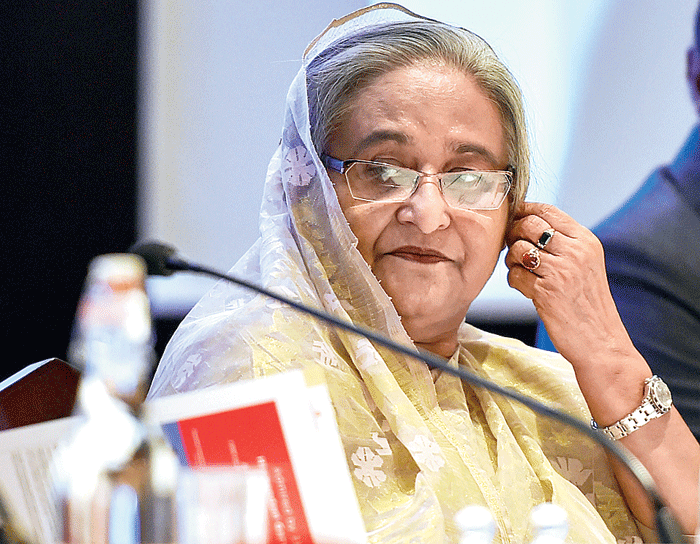A detailed article on factionalism within the Bangladesh army, perhaps the first such piece in many years, by one ‘Nirmala Saha’ in a strange website (www.worldnews.net) has thrown Dhaka-Chittagong’s power corridors in a tizzy. That it comes when the army is operationally deployed to combat the C-virus pandemic has lent grist to rumour mills in Bangladesh that churn out endless gossip.
‘Nirmala Saha’ is a fake byline. It is obvious that the article was written by a strong backer of Bangladesh’s army chief, General Aziz Ahmed, around the time rumours were afloat that he has ‘serious differences’ with the defence adviser, Major-General Tareque Siddique (retd), and two other advisers of Sheikh Hasina Wajed. There was speculation that he may be removed with an ambassadorial appointment a year before his term ended. The article claimed that a cabal of generals belonging to the alma mater, Jhenaidah Cadet College, had the support of both the Central Intelligence Agency and the Chinese intelligence, MSS, and they were conspiring for Aziz’s ouster to put their own man on the top job.
This, however, does explode the credibility of the article and bares the motive of the writer. How can the CIA and the MSS work together when the United States of America has been pushing for ‘listening posts’ focused on China in Sylhet, its military relations with Bangladesh are being closely watched by Beijing and when Donald Trump and Xi Jinping are involved in a trade war? But the article did turn the spotlight on the return of factionalism with the Bangladesh army, a force wrecked by mutinies and bloody factional manoeuvres in the post-1975 phase after a gang of recalcitrant colonels killed Bangabandhu Sheikh Mujibur Rahman and most of his family.
A succession of competent army chiefs managed to extricate the force from the internecine strife and transform it into a professional contingent whose ever-growing presence in the United Nations peacekeeping units and its superb performance in relief operations during natural calamities helped erase the memories of the 1975 mutinies when soldiers murdered officers — many of them heroes of the 1971 Liberation War campaign — on account of the provocation of competing factions.
Bitter factionalism did rear its ugly head during the 2009 BDR mutiny, when border guards murdered dozens of army officers on deputation to the frontier force. But an able and troop-friendly army chief, General Iqbal Karim Bhuiyan, helped stabilize the morale of the force, contain the Opposition-led violence in 2013-14 and get elections to take place. But Bhuiyan’s failure to get an extension or be elevated to chief of defence staff (possibly because that would undermine the defence adviser’s position) opened up new fissures. When Aziz edged out his protégé, Lieutenant-General Mahfuzur Rehman, to become chief, mentor and protégé turned against Aziz. That Aziz has now seemingly fallen out with Defence Advisor Siddiqui (the brother-in-law of Hasina Wajed’s sister, Rehana) has further complicated matters. Even the pro-Aziz faction is now divided, especially after the army chief forced lieutenant-general, Nazimuddin, who headed the ARTDOC, the army’s think tank, to go on leave prior to retirement. Nazimuddin wrote a strong letter to Wajed seeking reinstatement, vouching for his own integrity and loyalty (in the process raising questions over Aziz’s), a copy of which is available with this writer.
Aziz, believed to be a Wajed loyalist and friendly to India, is seen by his detractors as having undermined professionalism in the army that Bhuiyan and his predecessors had tried to instil. There were even rumours that he may stage a coup, taking advantage of the army’s on-ground deployment to tackle the pandemic. Incidentally the defence adviser was also in London, apparently to ‘handle’ a former staff officer gone rogue who is flooding social media with ‘exposés’ about Siddiqui and his family. None of these rumours appeared to have any truth, but that they were floating around pointed to dark forces trying to drive a wedge between the prime minister and the army.
There are at least four senior lieutenant-generals lobbying to succeed Aziz when his tenure ends next year. But each of them is due to retire before Aziz’s term ends. There is a possibility of some dark horse succeeding him. The knives are out. The rising star is the new DGFI chief, Major-General Saiful Alam, a decorated soldier with impeccable professional credentials, but one named by ‘Nirmala Saha’ as part of the Jhenaidah Cadet College cabal.
Wajed needs to take firm control of the situation before the army rocks her boat. Factional spillovers can snowball into reckless military adventurism, if Bangladesh’s past is any pointer. The army itself stands to lose its professional image — and UN peacekeeping quota — if the factionalism spills out into the open. At a time when the country is witnessing a silent Islamist revival evident in the emergence of the Jamaat-e-Islami breakaway, Amar Bangladesh Party, and its growing links with other pro-Pakistan Opposition leaders like the Bangladesh National Party’s Tareque Zia, professional stability in the army holds the key to future peace in Bangladesh. For India, a friendly but a professional army in Bangladesh committed to counter-terrorism and anti-radicalization is an imperative in maintaining the tranquillity in its own eastern and northeastern states in the midst of the escalating Rakhine conflict in neighbouring Myanmar and the smouldering CAA-NRC tensions in Assam and the rest of the region.










